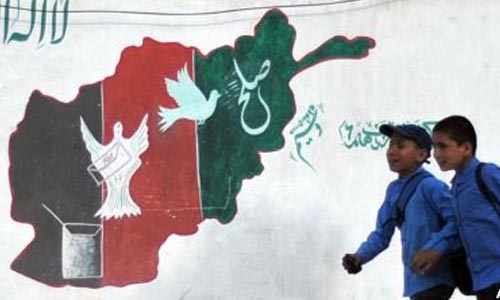Debated hotly, peace talks seem a gleam of hope for Afghan nation in 2019. Afghans, who left a deadly year behind, desire that warring factions will reach a consensus with Kabul government and its international allies on the peace table.
Despite the fact that peace talks made the national and international headlines within several years in the past without a tangible result, Afghans still hope peace will resurface through negotiations.
Not to mention the soldiers’ casualties, the heavy sacrifices paid by Afghan civilians within the past decade and so are indescribable. Afghans suffered untold sorrow and their rights and freedoms were trampled upon in the worst possible way. Terrorist networks, mainly the Taliban, violated humanitarian law flagrantly across the country. That is, they carried out indiscriminate attacks against people with not enough concerns shown by international community. Similarly, the Taliban spilt the blood of people under the guise of Islamic State so as to escape the public shaming. Years of war and violence inflicted much pain and sufferings upon Afghan men and women. Now even though peace remains as a dream-never-come-true for Afghan individuals, hope and pray for peace and prosperity linger among the nation.
With the ongoing heated discussions regarding peace talks, a number of Afghans tend to believe that peace will be a dream come true for the country.
On the other hand, however, many individuals, including political analysts, are of the view that the Taliban seek to risk nothing for the peace talks as they bargain for political advantages. “The prospects for political reconciliation in Afghanistan is largely unpromising, despite some progresses have been made. Political reconciliation would die out, if military means could succeed in settling Afghan issue, no matter who wins the game,” said Dr. Zeng Xiangyu, scholar in Institute of South Asian Studies at Sichuan University, in his article titled “Political Reconciliation: Prospects”. He believes that with the unmitigated insurgency, peace will remain elusive. According to him, the Taliban will come to negotiating table with less expectation if they are weakened in the battlefields. But if the Taliban gain upper hand in battlefields, they will haggle over high political price, which will not be acceptable for Kabul government. Thus, the fruition of peace talks will be an unlikely scenario.
To corner the Taliban and pressure them for meaningful peace talks, Kabul government and its international allies have to intensify their attacks against them. If the Taliban are not weakened militarily, they will hardly come to table with genuine intention.
Moreover, if the negotiating sides fail to reach a consensus and resolve their issues through a peaceful political settlement, the deadlock seems to resurface. “Another possibility is that both sides fall in a deadlock where each side expect a breakthrough by a coup de grace,” Zeng said.
The fact is that the Taliban are not logical negotiators, which leaves little room for public hope and optimism. For instance, the Taliban signaled for reconciliation through talks in the past as Kabul and the Taliban representatives held face-to-face talks on 7 July 2015 in Murree, near Islamabad. But the Murree talks, which were stalled by the news of Mullah Omar’s death, did not bear the desired result. Therefore, a number of Afghans are not much hopeful about meaningful talks.
Overall, the fluctuation between hope and fear continues as the US has put all its weight behind the talks. If the talks between US and the Taliban do not lead to peace in Afghanistan, the re-emergence of deadlock in talks is a strong possibility.
But the engagement of different regional stakeholders in the talks such as Saudi Arabia and United Arab Emirate, besides Pakistan, sparks off more hope for the US.
After all, Iran has also signaled for engaging in the talks after being accused of supporting the Taliban. Iran tends to show that it will practice upon the principle of good neighborliness. It has yet to prove it.
Likewise, China has already shown its sincerity through its engagement for peace talks as she has been a member of Quadrilateral Coordination Group. China has also organized the China-Afghanistan-Pakistan ministerial dialogue, the second round of which was held in Kabul few days ago. The engagement of regional stakeholders in peace talks is highly comprehensive by now, which creates some hope for the public. Whether or not the talks result in peace, the time will decide.
Afghans, who have borne the brunt of terrorism and insurgency, have no choice other than hoping for peace and stability in every New Year. It is hoped the year 2019 will be void of violence.
Home » Opinion » Afghans’ Fluctuation between Hope and Fear
Afghans’ Fluctuation between Hope and Fear
| Hujjatullah Zia

